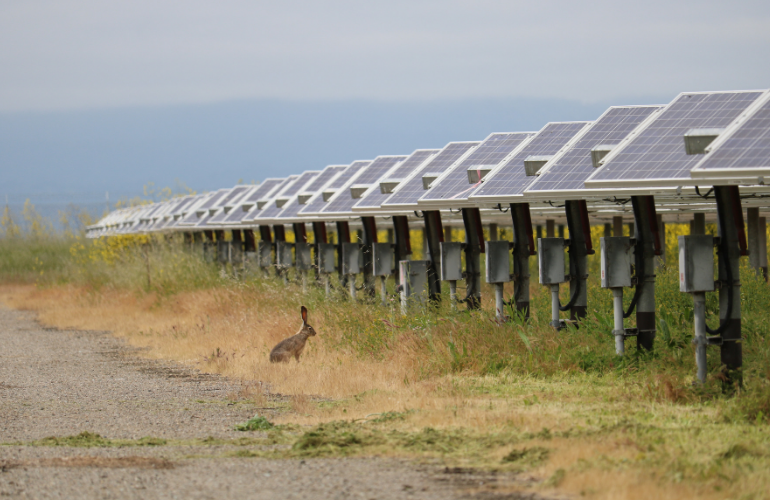
Among the $14 million in U.S. Department of Energy grants awarded this week to researchers to study how solar projects affect wildlife, is a study that will focus on such projects in Oklahoma, Arkansas and Kansas.
The University of Arkansas at Fayetteville received a $1.3 million grant to study large-scale solar facilities and how wildlife interact with them. The study will also look into benefits from native vegetation management practices in the three states.
The Department of Energy said the projects are part of DOE’s nearly $100 million renewable power research portfolio that invests in innovative, cost-effective solutions to minimize wildlife impacts—and maximize the environmental benefits—of renewable energy technologies. As renewable energy deployment grows to combat the climate crisis and achieve President Biden’s goal of net-zero carbon emissions by 2050, DOE is supporting research to ensure renewable energy deployment also benefits native wildlife and ecosystems.
“DOE is committed to ensuring that renewable energy deployment protects natural environments,” said U.S. Secretary of Energy Jennifer M. Granholm. “This first-ever DOE investment in tools to better understand how solar energy infrastructure interacts with native wildlife and the environment will help increase adoption of ecosystem-friendly clean energy deployment.”

Through the Deploying Solar with Wildlife and Ecosystem Services Benefits (SolWEB) funding program, researchers will study the interactions of pronghorn, pollinators, birds, and other species with solar energy facilities in 26 states. This funding program also includes DOE’s first-ever investments in tools that can assess and help optimize ecosystem services at solar installations.
PROJECTS ADDRESSING WILDLIFE INTERACTIONS ($8.8 MILLION):
- Cornell University (Ithaca, NY): $2 million to use an emerging technology to quantify insect biodiversity and pollinator communities at solar facilities.
- Renewable Energy Wildlife Institute (Washington, DC): $600,000 to design and build a solar-wildlife data-sharing infrastructure that enables stakeholders to assess solar-wildlife interactions and improve wildlife management practices.
- Sandia National Laboratories (Albuquerque, NM): $2 million to develop smart surveillance technology to monitor bird activity and study measures to prevent bird fatalities at concentrating solar-thermal power facilities.
- University of Arkansas (Fayetteville, AR): $1.3 million to assess biodiversity at large-scale solar facilities to gain an understanding of solar-wildlife interactions and benefits from native vegetation management practices in Arkansas, Kansas, and Oklahoma.
- University of Massachusetts at Amherst (Amherst, MA): $1.2 million to conduct the first assessment of avian reproductive success at solar facilities and apply emerging bioacoustics technology to monitor native insect activity in the Northeast.
- Wildlands Network (Santa Fe, NM): $1.7 million to evaluate the response of pronghorn and other mammals to installation of utility-scale solar energy systems in Colorado, Utah, Arizona, and New Mexico.
PROJECTS ADDRESSING ECOSYSTEM SERVICES ($5.3 MILLION):
- Argonne National Laboratory (Lemont, IL): $2 million to develop a national soil data collection system at solar facilities that enables soil health and soil ecosystem services assessments.
- Cornell University (Ithaca, NY): $1.5 million to develop a tool for assessing the costs and benefits of ecosystem services provided by large-scale solar facilities for the solar industry and host communities in the Northeast.
- Great Plains Institute (Minneapolis, MN): $1.8 million to create an equitable ecosystem services framework based on host community and tribal priorities in the Midwest.
Source: DOE release
 PEMA Professional Energy Marketers Association
PEMA Professional Energy Marketers Association

